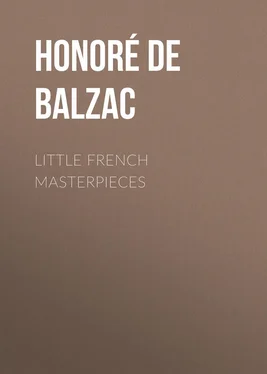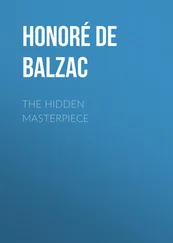Honoré Balzac - Little French Masterpieces
Здесь есть возможность читать онлайн «Honoré Balzac - Little French Masterpieces» — ознакомительный отрывок электронной книги совершенно бесплатно, а после прочтения отрывка купить полную версию. В некоторых случаях можно слушать аудио, скачать через торрент в формате fb2 и присутствует краткое содержание. Жанр: foreign_antique, foreign_prose, на английском языке. Описание произведения, (предисловие) а так же отзывы посетителей доступны на портале библиотеки ЛибКат.
- Название:Little French Masterpieces
- Автор:
- Жанр:
- Год:неизвестен
- ISBN:нет данных
- Рейтинг книги:5 / 5. Голосов: 1
-
Избранное:Добавить в избранное
- Отзывы:
-
Ваша оценка:
- 100
- 1
- 2
- 3
- 4
- 5
Little French Masterpieces: краткое содержание, описание и аннотация
Предлагаем к чтению аннотацию, описание, краткое содержание или предисловие (зависит от того, что написал сам автор книги «Little French Masterpieces»). Если вы не нашли необходимую информацию о книге — напишите в комментариях, мы постараемся отыскать её.
Little French Masterpieces — читать онлайн ознакомительный отрывок
Ниже представлен текст книги, разбитый по страницам. Система сохранения места последней прочитанной страницы, позволяет с удобством читать онлайн бесплатно книгу «Little French Masterpieces», без необходимости каждый раз заново искать на чём Вы остановились. Поставьте закладку, и сможете в любой момент перейти на страницу, на которой закончили чтение.
Интервал:
Закладка:
"I have not, like a multitude of ignorant fools, who fancy that they draw correctly because they make a carefully shaded stroke, marked distinctly the outer lines of my figure and given prominence to the most trivial anatomical details, for the human body does not end in lines. In that regard, sculptors can approach the truth more nearly than we can. Nature demands a succession of rounded outlines which shade into one another. Strictly speaking, drawing does not exist! – Do not laugh, young man! However strange that remark may seem to you, you will understand its meaning some day. – The line is the means by which man interprets the effect of light upon objects; but there are no lines in nature, where everything is full; it is in modelling that one draws, that is to say, that one removes things from the surroundings in which they are; the distribution of light alone gives reality to the body! So that I have not sharply outlined the features; I have spread over the outlines a cloud of light, warm half-tints, the result being that one cannot place one's finger upon the exact spot where the outline ends and the background begins. Seen at close quarters, the work seems cottony and to lack precision; but two yards away, everything becomes distinct and stands out; the body moves, the forms become prominent, and one can feel the air circulating all about. However, I am not satisfied yet; I still have doubts.
"Perhaps I should not have drawn a single line; perhaps it would be better to attack a figure in the middle, devoting one's self first to the prominences which are most in the light, and passing then to the darker portions. Is not that the way in which the sun, that divine painter of the universe, proceeds? O Nature, Nature! who has ever surprised thee in thy flights? I tell you that too much knowledge, like ignorance, ends in a negation. I doubt my work!"
The old man paused, then continued:
"For ten years, young man, I have been working, but what are ten short years when it is a question of contending with nature? We have no idea how long a time Pygmalion employed in making the only statue that ever walked!"
The old man fell into a profound reverie, and sat with staring eyes, mechanically toying with his knife.
"He is conversing with his spirit now!" said Porbus in an undertone.
At that word Nicolas Poussin became conscious of the presence of an indefinable artistic curiosity. That old man with the white eyes, staring and torpid, became in his eyes more than a man; he assumed the aspect of an unreal genius living in an unknown sphere. He stirred a thousand confused ideas in his mind. The mental phenomenon of that species of fascination can no more be defined than one can define the emotion aroused by a ballad which recalls the fatherland to the exile's heart. The contempt which that old man affected to express for the most beautiful works of art, his wealth, his manners, the deference with which Porbus treated him, that work kept secret so long – a work of patience and of genius doubtless, judging by the head of a Virgin which young Poussin had so enthusiastically admired, and which, still beautiful, even beside Mabuse's Adam , bore witness to the imperial workmanship of one of the princes of art – everything, in short, about the old man went beyond the bounds of human nature.
The one point which was perfectly clear and manifest to Nicolas Poussin's fertile imagination was a complete image of the artistic nature, of that irresponsible nature to which so many powers are entrusted, and which too often misuses them, leading cold reason, the honest bourgeois, and even some experts, through innumerable rock-strewn paths, where there is nothing so far as they are concerned; whereas that white-winged damsel, unreasoning in her fancies, discovers these epic poems, châteaux, and works of art. A sardonic but kindly nature; fertile but sterile. Thus, to the enthusiastic Poussin, that old man had become, by an abrupt transfiguration, art itself, art with its secrets, its unruly impulses, and its reveries.
"Yes, my dear Porbus," Frenhofer resumed, "I have failed thus far to meet an absolutely flawless woman, a body the outlines of which are perfectly beautiful, and whose colouring – But where is she to be found in real life?" he asked, interrupting himself, "that undiscoverable Venus of the ancients, so often sought, of whom we find only a few scattered charms? Oh! to see for an instant, but a single time, that divine, complete, in a word, ideal nature, I would give my whole fortune. Aye, I would seek thee in the abode of the dead, O divine beauty! Like Orpheus, I would go down into the hell of art to bring life back thence."
"We may go away," said Porbus to Poussin; "he neither hears nor sees us now."
"Let us go to his studio," suggested the wonder-struck youth.
"Oh! the old fellow knows how to keep people out. His treasures are too well guarded for us to obtain a glimpse of them. I have not awaited your suggestion and your longing before attacking the mystery."
"So there is a mystery?"
"Yes," Porbus replied. "Old Frenhofer is the only pupil whom Mabuse would ever consent to take. Having become his friend, his saviour, his father, Frenhofer sacrificed the greater part of his property to humour Mabuse's passions; in exchange Mabuse bequeathed to him the secret of relief , the power of imparting to figures that extraordinary appearance of life, that touch of nature, which is our never-ending despair, but of which he was such a thorough master that one day, having sold and drunk the flowered damask which he was to wear on the occasion of Charles V.'s entry into Paris, he attended his master in a garment of paper painted to represent damask. The peculiar brilliancy of the fabric worn by Mabuse surprised the Emperor, who, when he attempted to compliment the old drunkard's patron, discovered the fraud.
"Frenhofer is passionately devoted to our art, and he looks higher and farther ahead than other painters. He has given much profound thought to the subject of colouring and to the absolute accuracy of lines; but he has studied so much that he has reached the point where he is uncertain of the very object of his studies. In his moments of despair he declares that drawing does not exist and that only geometrical figures can be made with lines; which is going beyond the truth, for with lines and with black, which is not a colour, a human figure maybe drawn; which proves that our art, like nature, is made up of an infinite number of elements: drawing furnishes a skeleton, colour gives life; but life without the skeleton is much less complete than the skeleton without life. In short, there is one thing which is more true than any of these, and that is that practice and observation are everything with a painter, and that, if reason and poetic sense quarrel with the brush, we arrive at doubt, like our excellent friend here, who is as much madman as painter. A sublime artist, he was unfortunate enough to be born rich, which permitted him to go astray; do not imitate him! Work! Painters ought not to meditate, except with brush in hand."
"We will find our way there!" cried Poussin, no longer listening to Porbus, and undeterred by doubts.
Porbus smiled at the young stranger's enthusiasm, and, when they parted, invited him to come to see him.
Nicolas Poussin walked slowly back to Rue de la Harpe, and passed, unperceiving, the modest house in which he lodged. Ascending his wretched staircase with anxious haste, he reached a room high up beneath a roof supported by pillars, a simple and airy style of architecture found in the houses of old Paris. Beside the single, dark window of that room sat a girl, who, when she heard the door, sprang at once to her feet with a loving impulse; she recognised the painter by the way he raised the latch.
Читать дальшеИнтервал:
Закладка:
Похожие книги на «Little French Masterpieces»
Представляем Вашему вниманию похожие книги на «Little French Masterpieces» списком для выбора. Мы отобрали схожую по названию и смыслу литературу в надежде предоставить читателям больше вариантов отыскать новые, интересные, ещё непрочитанные произведения.
Обсуждение, отзывы о книге «Little French Masterpieces» и просто собственные мнения читателей. Оставьте ваши комментарии, напишите, что Вы думаете о произведении, его смысле или главных героях. Укажите что конкретно понравилось, а что нет, и почему Вы так считаете.












